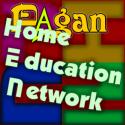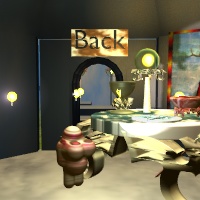
Some Frequently Asked Questions About Home Education
… and yet another attempt to answer them.
Prepared by Magus Thom Potter [2000, 2003].
In any social group, there are children whom we
must teach, and elders who must teach [ see Maslow; Aesthetic Needs]. Within a family,
this need comes with the job, “Parent.” Before schools were
used to warehouse unemployable children (due to the Child Labor
reforms) parents and their extended families were the primary source
of education for their young. In a religious community, that extended
family will include the “Religious Professional.” The
duties of the Sorcerer, or Religious Professional, has been
delegated to teachers, psychologists, and
sociologists. These specialists bring a wealth of theoretical
knowledge that is often unappreciated by those who must employ those
theories. Then again, no theory is worth spit if it cannot be
practically employed. Even in our American society, the
responsibility for the education of the young still remains the
responsibility of the parents. Yet, it is acceptable for the parent
to seek help, and delegate some of that responsibility to someone who
is better equipped to manage it. For those who educate their young at
home, even just part of the time, the lion’s share of that
responsibility rests either solely or mostly on the shoulders of the
Parents and Family. Whatever reason prompts a parent to do so, it
would benefit society to support, rather than hinder such efforts.
What is Education?
Education, in the traditional sense (as opposed to the ideal
sense), refers to a process in which a person obtains information,
knowledge, or technique from someone else who already possesses it.
It is essentially one-directional and can vary from a tedious rote-
learning to an inspirational opening up of intellectual horizons and
consciousness.
(Rosenblum, Bernard;
MD, [1983]; The Astrologer’s Guide to Counseling:
Astrology’s role in the helping professions. CRCS Publications,
Reno, NA.)
Why do people choose to educate their
children at home?
There are many reasons to Home Educate a child. The most
significant is that often the public school system may be ill
equipped to teach some children. Public schools are often designed to
teach to the average child. If your child is not average, he or she
may be left to fend for themselves. While schools sometimes try to
remedy this with special education, and classes for the gifted and
talented, they are often inadequate for many children. Many teachers
are intimidated by the “Profoundly intelligent” and may
ridicule or simply ignore that child.
Some will become their child’s tutor because they are on the
road a lot, as musicians or drivers, and are always disappointed when
they must leave their family behind … so they don’t. Some
parents feel it is “cruel and unusual punishment” to have
their child sit in a buss for an hour-and-a-half just to go to
school. These children are then denied the privilege of after-school
activities, art programs, and sports. (This does not address the
health hazard many busses pose to our children and environment.) Some
parents home educate because their child has -- or they feel their
child has -- been abused by an impersonal system desiring only to
warehouse their child for financial gain.
Often, a child is home educated for cultural reasons. Some
believe children are the sole responsibility of that child’s
parents. These parents may have no griefs with the public system,
unless it is to feel that the public schools are infringing on their
territory. Some, however, are deeply concerned about what they see as
the delinquency of the school’s influence over children. They
are deeply troubled by reports of poor academic standards of the
students the schools are graduating. These parents feel that a home
education might be a better expenditure of their hard earned dollar.
Others feel that the schools either inadequately in deleteriously
influence their child’s mental, physical, and spiritual
development.
At the heart of this answer are the parents’ own reasons. It
is the parent who must choose what is best for the child. They may
home educate exclusively, or as a supplement to what the public
schools provide.
What is the first step in educating our
children at home?
In all, you have been teaching your child from the day they were
conceived. They have learned so much on their own --number skills,
language and grammar, negotiating skills -- before they are ready for
kindergarten. They have learned most of this by watching and
participating in those who are in their environment. So, the primary
role model, hero and hera (the parents), will set the tone and
conditions for an education. The first five years of a scholar’s
life will set the foundation for the next fifty or so.
First step, is to decide. That requires enough information to
make an informed decision. Once you have chosen to home educate your
child, get in touch with others who are homeschooling. They will be a
valuable asset.
Next, it would help if you could take some classes in child
development at a local community college. No, this does not mean that
you don’t know anything, but this will enhance your ability to
help your scholar.
What is the difference between homeschooling
and Unschooling?
Home Education is the process of educating your children at home,
with the parents being the student’s primary tutor. This is
often called homeschooling, and the two terms are interchangeable.
Unschooling is a special case of homeschooling, where the child
becomes the primary tutor (in Montessori fashion), assisted by the
parent. A subject matter is best learned when the student finds some
sort of “personal” interest in it. While it is always good
to expose a child to all subjects and environments for learning, the
student is best equipped to determine what is best for them. Like the
Montessori method, this style of education is self-determined. But,
unlike the Montessori style, there are no preset rules or self-
correcting lessons. Learning will happen because the scholar chooses
it to.
What about Private Schools?
If you can afford one, and you feel it is the best place for your
child to develop, go fo it! Private Schools generally have smaller
classes, and higher standards for their scholars.
What about
“socialization?”
Having suffered the satisfaction of bullies, I have some
experience with the socialization one may get in a public school. The
forces of peer pressure and the struggles of a pecking order can be
hazardous to a child’s development. Public schools do not
directly cultivate aggression as a goal of frustration. They are,
however, breeding grounds for behavior that is … less than
civilized. This is often one of the reasons for homeschooling.
In a network of homeschool families, where the children’s
ages range widely, and supervision is more personal, a student may
learn better social skills. Figures can lie, and liars can figure,
but the statistics in this area are strongly suggestive. Home
educated children are better adjusted, and more socially skilled than
many who are educated by the “system.”
Also, there are many organizations, such as Campfire kids, who
can help with the socialization of your child. Not only that, your
child can gain valuable experiences on camping trips, and other get-
togethers. Better, if you could help with your child’s troop, it
will enhance your life, as well as you relationship with your child.
(Ps, it is also good to let your young scholar have activities where
you are not around. This will give then room to learn some autonomy.)
My child is interested in a subject I have
absolutely no knowledge of. What do I do?
Do I see an opportunity? First, don’t worry about it. This
will give you an opportunity to gain research and development skills.
Even if you do have knowledge about a subject, don’t just feed
your student answers. My favorite line is, “I can’t really
say. Why don’t we try to find out together?” Then, with the
help of a library, the internet, and an auspicious question (the sort
that I would ask myself when I am researching something) will do more
than just a retort of the answer, expecting the child to remember.
Cultivating a scholar’s curiosity is the best thing you can do.
In the end, you will both learn something new.
This is also where a network can come in handy. Does the scholar
want to know something about music? You say you can’t carry a
tune in a bucket? Someone in the network is probably quite talented
with music. I would suggest you both take lessons. Someone may have a
horse they may “feed-lease” to you, and set a small fee or
barter for lessons.
Where can I get textbooks for a relatively low
cost?
You may get books of all sorts from several places. While a
Library will only allow a limited loan on a book, they invariably
have a large supply of them. They are in the business of books, and
the librarians can be an invaluable source of knowledge.
Schools will sometimes sell used and out dated books, on the hope
of gaining money for other things while they are making room for new
books. I would recommend staying away from books on science, but some
books on reading and social sciences will not likely be changing very
fast.
Fellow home educators will often out grow the need for some
reusable supplies. They might be rather happy to sell something to
you for a reasonable cost. Close to some colleges and universities,
there are independent used book sellers who buy and sell used college
level text books. Also, students at these colleges will be unhappy
with the buy back rates, and will post their used (or not so used)
text books for sale. Sometimes, the college will unexpectedly want a
new version of a text book -- whose only difference to the old
edition maybe the design of the cover -- and may have no place to
sell the older books they have.
Then, you may go to any of the online book sellers, such as Barns
& Noble.com. I have found that the books are cheaper after
delivery than they are at the college after an ASB discount.
Sometimes, inquiring with the publisher can provide an even greater
discount, especially if there are several in your area who would like
that book.
At what age is my child required to attend
school?
This is generally regulated by your school district, which in
turn is regulated by the state’s superintendent’s office,
which is in turn regulated by the state’s legislature, which is
in turn regulated by the state’s constitution. Public schools
generally do not require attendance until the student is about six
years old, (see your local district for details on this).
Kindergarten is generally not a requirement, which is why it is
generally the most underfunded class on campus.
An issue does arise, though. If a tutor chooses not to take
advantage of an opportunity at a learning event, that opportunity may
never come again. If your four-year-old seems to have a skill at
numbers, or art, or music, seize the moment. If, on the other hand,
your child is taking a little long to start reading on his or her
own, relax. A developmental assessment may be in order. Your child
may just be delayed in that one area of knowledge, but excel in
another. If this is the case, take advantage of the skill, and try to
tie the difficulty in somehow … an exceptional math student
maybe made a better writer if asked to write out her or his
experiences.
This is one of the main failings of the Public system. A primary
key is to take advantage of the scholar’s interests at the time
of the interest. Cultivate skills and knowledge in an atmosphere of
support and encouragement. And always be the model of behavior you
would expect out of your children.
What are the regulations for homeschooling in
my state?
The laws and regulations on this are ever changing. Every child
that is not in a public school is that much money that school does
not get. So, the public system is often “aggressively”
opposed to home education.
You may go to several places on the Web. The National Home
Education Network is a good place to start. Getting in contact with
other homeschoolers in your neighborhood is equal, if not better.
They have been there, and know what to expect in your area.
All states have a legislative web site. Using that, and using
their search engines will do a lot, even if you are not a lawyer. Who
knows, it may be like a computer. Give it to your child and let him
or her digest it for you.
How many days or hours are you required to
teach?
States often expect a determined number of hours, and that each
subject is segmented into its own time slot. The states, however,
will “trust” the tutor to regulate these things. Some
states will expect a report of what you are doing. A daily journal
and portfolio ought to do nicely. These are useful in other ways.
They will help both the tutor and the student realize just how far
they really have come. This can help when you are in the “dark
tunnel.” It will also ensure that the light at the end is not a
freight train coming your way.
Do public schools have to help us in any way?
If you are new to home education, I would recommend getting
involved with a network of fellow homeschoolers. Their experiences
with the system will better help you learn whether your local school
is willing to help or not. Some school systems will want to help;
others are aggressively opposed to any competition. Some schools will
provide access to extracurricular activities. Some will make supplies
available for cost, or a small profit. Others would rather you not
involve them.
Some teachers might be willing to help. Their knowledge of human
development and the subject matters, can be of great value. If you
want to homeschool, you would do well to take a teacher’s advice
as just that. This is your child, and you have
known him or her all her or his life. Theories are grand, but you
must make them fit where they will.
How will I know what my child is expected to
accomplish for any given grade?
Many homeschoolers ignore the grading system. They feel it is a
poor assessment of a child’s abilities. It also ignores the
special capacity of some children, either in specific areas or in
more global fields of study. The best assessments of your
scholar’s accomplishments are those that you and your child
give. Who knows your student better than you? Your student! This is
best, as they maybe updated from time to time. On a better note, it
is best to have your student set goals, with your guidance to ensure
they are challenging enough without being too much so. Then, not only
is the scholar participating in goal setting, a skill much in need,
but you may both see when those goals have been met.
Many Departments of Education will have “PDF” files and
other sources with information about expectations by grade level and
subject. If you feel led to use these, they are often available free
on line.
What good references and resources exist on
the net?
Eh … this page has only so much room for code and
information.
The Pagan Home Education Network has a page of Academic
Resources that ought to get you started. This web site will also be
a resource. I have digested many theories on human development for
you to reference and see that your child is normal, for a heathen.
Any search engine will take you to resources on homeschooling and
other academic information.
My Culture of Faith employs Magic.
When Should I start teaching my child?
It is better not to teach your child Magic, not as a set of
“Rules and ways of doing things.” Children are
born with an incredible access to Magic. Teaching them the rules and
regulations of “Grand Magic” can stifle their
development in that area.
It is better to focus on their physical, mental, and emotional
development. Allow them to be children. A child must explore the
world and get a grasp on their relationship to Her. Help them explore
the world. Take them to places, let them get their hands dirty. Let
them help you with cooking, and building costumes. When they have
dreams, be there to help them sort them out. And, whatever happens,
remember that you are human too.
In the end, your child will develop a mastery of Low Magic (a
natural and instinctual grasp of the forces of nature and humanity),
and can commune with nature and Her spirits. They will trust their
instincts, a thing that is most needed by the any Sorcerer. In the
end, your child will learn their Craft without any formal lessons.
So, when can I teach my child “Grand
Magic?”
The Grand Course of Magic is performed under the theater of
Ritual and ceremony. Rules are followed and procedure is required.
Because rites are social in nature, these procedures are required for
those who are not as close to the veils as the Magus is. When the
child is about eleven, the responsibilities of the ritual will be
something they will understand. They will also be old enough to know
when they ought to be serious, and when they can play. That balance
is needed in the face of God and Her children.
It would be good to start by teaching the young child myth, lore,
and legend, as well as the various symbols and tools. Let them
explore and choose the best way to use them. (On a side note, it is
best to teach a child a couple of additional languages before they
are eight years old. Something about the brain helps them to learn
several languages without much trouble. Just leave the symbols for
the later date.)
The greatest harm a tutor can do is give a child specific rules
about Magic at this time. Rather, show them the general notions, let
them learn the various avenues of expression. Then, when they need to
be creative, (I mean, they forgot something) they will know in what
direction they wanted to go.
return to the ^top










